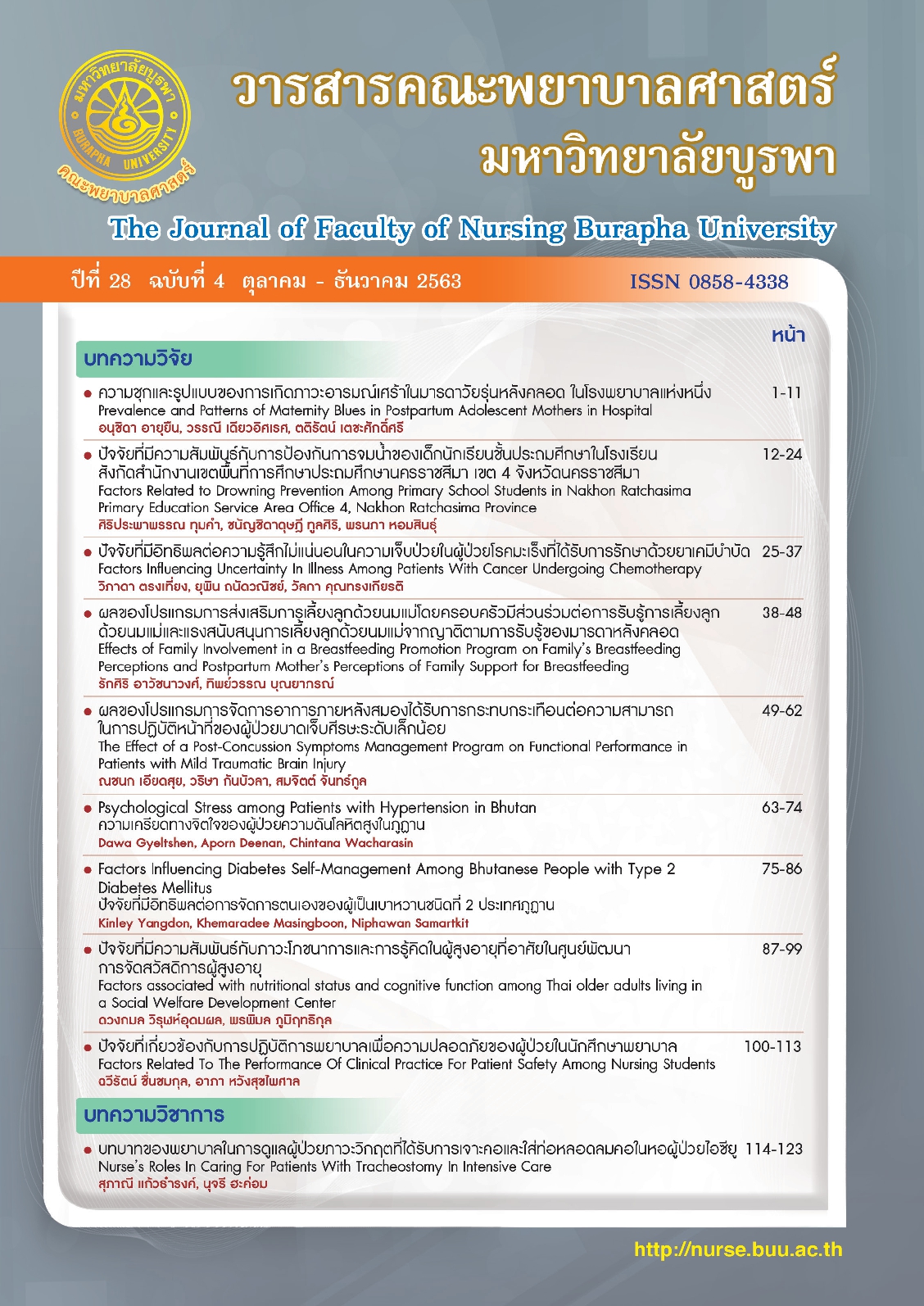Effects of a Family Involvement for Promoting Breastfeeding Program on Family’s Breastfeeding Perceptions and Postpartum Mothers’ Perceptions on Family Support for Breastfeeding
Keywords:
Breastfeeding, family involvement, perception, family supportAbstract
This quasi-experimental study aimed to test the effects of family involvement in a breastfeeding promotion program on family’s breastfeeding perceptions and postpartum mothers’ perceptions of family support for breastfeeding. Participants were postpartum mothers and who had been admitted at Trang hospital and their families. The twenty-five participants were randomly divided into control and experimental groups. The experimental group received the family breastfeeding promotion program from July through October 2019. The control group received regular care. At the end of the program, both groups were assessed using the perceptions of breastfeeding questionnaire and the family support for breastfeeding questionnaire. Data were analyzed using descriptive statistics and t-tests.
Findings showed that, after the program, the mean scores of family’s breastfeeding perceptions were significantly higher in the experimental group than in the control group (p < .05). However, there was no significant difference between the groups in terms of the mean scores of family support for breastfeeding. Therefore, in order to encourage breastfeeding by postpartum mothers, families should be involved in promoting breastfeeding at all stages of pregnancy.
References
Breastfeeding Center of Thailand Foundation. (2014). Best Milk: The 2nd Breastfeeding Literature Series. Bangkok: Iyara Publishing.
Cheuapirojkit, S. (2018). Creating a wonderful life with breast milk. (7th edition). Bangkok: Green Life Printing house. [In Thai]
Chisuwan, C., Prasopkittikun, T., Sangperm, P., & Payakkaraung, S. (2012). Predictive power of support from husbands,grandmothers, and nurses on duration of exclusive
breastfeeding. Journal of Nursing Science, 30(1), 70-80. [In Thai]
Jantarasiew, B., Luangarun, O., & Boonyaporn, T. (2018). Nurses' experiences related to the promotion of breastfeeding within the first 48 hours after delivery. Journal of Nursing and Health Sciences, 12(3), 50-59. [In Thai]
Kaewwimol, P. (2019). Effectiveness of a breastfeeding self-efficacy program through family participate on weight gain of preterm infants and continuation of breastfeeding.
Thai Science and Technology Journal, 27(6), 1106-1117
Makak, N. & Turner, K. (2016). Nurses’ roles and promoting the participation of husbands or Relatives for the success of breast feeding. Journal of Nursing Division, 43(3), 115-125. [In Thai]
MulatuDibisa, T., & Sintayehu, Y. (2020). Exclusive breast feeding and its associated factors among mothers of < 12 months old child in Harar Town, Eastern Ethiopia: A Cross- sectional study. Pediatric Health, Medicine and Therapeutics, 11, 145-152.
Plodpluang, U., Srichan, A., & Kaewpraphan, S. (2016). Effect of breastfeeding promotion based on familial support program to knowledge, attitude and behavior of postpartum mothers and familiars’s member. Phranakhon Rajabhat Research Journal (Science and Technology), 11(2), 41-52. [In Thai]
Sincharoen, I. & Winyan, N. (2009). The results of using the program "Full, warm, loving from mother's breast" towards knowledge, attitude and breastfeeding behavior in postpartum mothers. Journal of Nursing Division, 36(3), 18-31. [In Thai]
Suriyakhan, A. (2005). The effect of family nursing on family perception and support in Breastfeeding. Master’s thesis, Faculty of Nursing, Khon Kaen University. [In Thai]
Wichitsukhon, K., Saengpherm, P., Watthayu, N., Rueagjiratthian, S., & Phayakkharuang, S. (2014). Breastfeeding by the Center for Breastfeeding and Baby Nutrition Training Faculty of Nursing, Mahidol University. Bangkok : Pre-One. [In Thai]
Wungkum, A., Thaiyapirom, N., Jintrawet, U. (2011). Factors related to continued breast feeding among mothers with preterm infants. Nursing Journal, 38(3),74-82. [In Thai]
Thato, R. (2018). Nursing research: Concepts to application (3rd). Bangkok: Chulalongkorn University Printing House.





